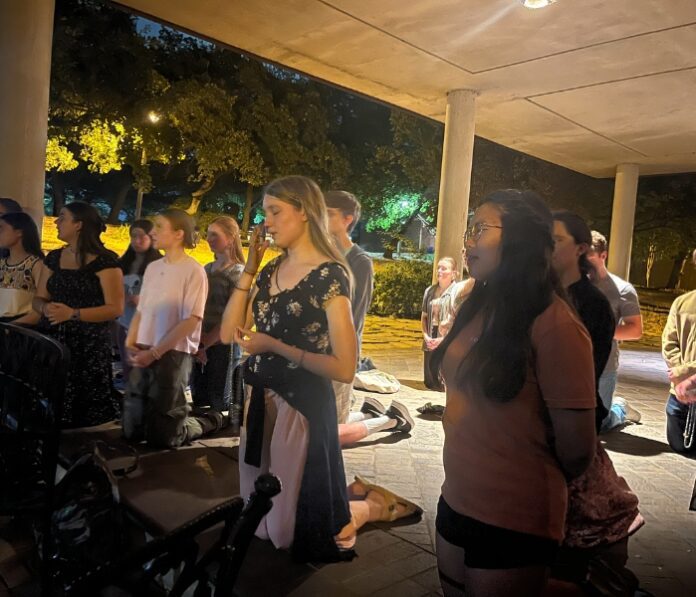
A discussion of recent discussions on the Eucharist
Since the beginning of the semester, I have had the blessing of moderating an ongoing dialogue between the University of Dallas student body about Eucharistic reverence at Mass.
As commentary editor, my desire is that this section reflects a typical UD conversation that one might hear on the Mall or in the Cap Bar. What a gift it is to be at a school where the source and summit of the Christian life is a primary topic of conversation, not only in Mass and in theology classes, but also in the school newspaper!
However, these debates on aspects of the liturgy came under a new light for me several weeks ago when news emerged of a “Black Mass” being scheduled by the Satanic Temple of Atlanta.
The occurrence of such an event should be appalling for all who believe in religious liberty and oppose religious discrimination.
To their credit, the Satanic Temple does not actually worship Satan. But this is because they do not believe in God or Satan.
The condonement or toleration of a Black Mass has nothing to do with protecting religious freedom. If the Satanic Temple is atheistic, then its only purpose in holding a Black Mass is to mock and discriminate against the Catholic Church. Public religious hatred by a political organization should be seen as a civil rights violation and should not be overlooked.
But as disturbing as a Black Mass – and the sexual obscenity often involved – is from a civil rights perspective, the far more grievous aspect of the event is that a Black Mass often involves the desecration of a consecrated Host.
Satanists steal the Host from a Catholic Church and then “offer it to Satan,” often stomping on the Host and covering it with various bodily fluids.
When these atrocities are committed against our Lord, suddenly the question of whether to receive from a priest or from an EMHC seems less urgent.
The intention behind Eucharistic reverence should firstly be the glory of God. This includes loving the Eucharist and centering our lives around the Mass with such zeal and charity that others long to share in our joy.
It also includes distributing and receiving Communion in such a way that nobody can ever walk away with an unconsumed Host,something that can take place whether one receives on the hands or the tongue.
The question underlying all liturgical debates should always be, “How does our participation in the liturgy cultivate a participation in Christ’s saving charity, thus increasing His glory and preparing us for eternal glory and communion in heaven?”
UD students reflected their love for the Eucharist and desire to participate in the salvation of souls in the way that they responded to the threat of the Black Mass on Oct. 25. It was truly inspiring to see so many students gathering for nightly rosaries leading up to the Black Mass, praying on their own and performing acts of reparation for the event.
And what a clear answer our prayers received! On Oct. 25, the Archdiocese of Atlanta received assurance from the Satanic Temple that no Host would be used.
Although the Satanic Temple thoroughly mocked the Church through their “ritual”, they committed no direct sacrilege against the Eucharist that day. But Satanic desecrations of the Eucharist have taken place throughout history. They will continue to take place.
Jesus knew this. On the night that He instituted the Eucharist, He saw every time a person would steal Him from a church. He saw every Satanic stomp and stab and spill upon His Body.
He saw every unworthy reception of Holy Communion (which writers like Graham Greene compare to a Black Mass), every distracted mind, every act of irreverence during the Mass. And even so, He gave.
On the night of the Last Supper, He saw you and He believed that the risk of a Black Mass could not outweigh the reward of intimacy with you in this life and in the next. He saw your classmates, He saw the depths of their hearts in a way that nobody else can and He loved all of you “to the end.”
As we continue to cultivate Eucharistic revival in our hearts, on our campus and in our country, let us remember that Christ’s unfathomable love is the central mystery of our Faith and of our Mass. Although we should strive for the utmost reverence before our Eucharistic Lord, He will always come to us.
C.S. Lewis writes, “And this is the marvel of marvels, that He called me beloved.” Regardless of how you receive the Eucharist, regardless of your suffering, regardless of the state of our nation, the deepest marvel of your life is that you are beloved by a God who risks His own violation for you. May we never forget His love.
Bio: Larisa Tuttle is a senior double major in Theology and English. She is the Commentary Editor for The Cor Chronicle, the President of the Thomistic Institute at the University of Dallas and a Blessed is She mentor.
